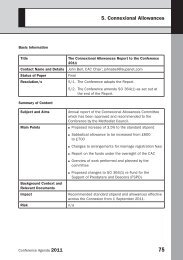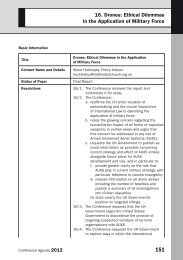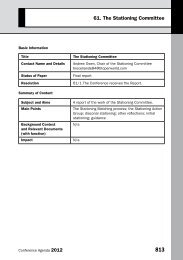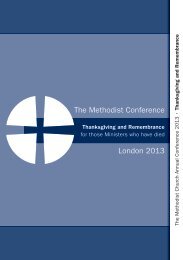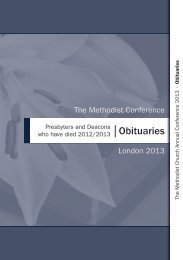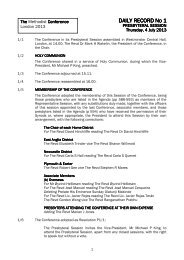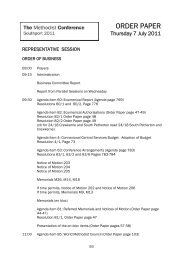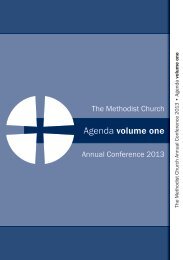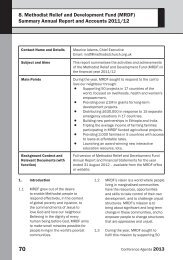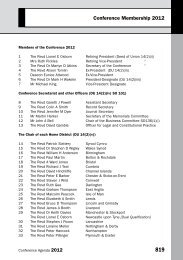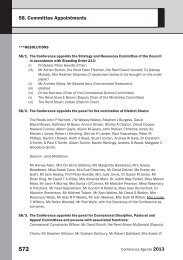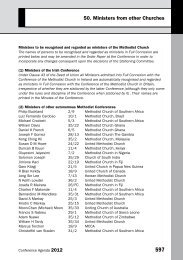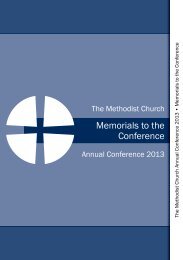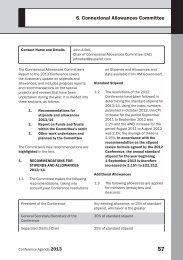Agenda Volume 3 - Methodist Conference
Agenda Volume 3 - Methodist Conference
Agenda Volume 3 - Methodist Conference
You also want an ePaper? Increase the reach of your titles
YUMPU automatically turns print PDFs into web optimized ePapers that Google loves.
57. The Fruitful Field Project<br />
more locally in ‘regional’ areas,<br />
and the capacity to deliver learning<br />
programmes well. This points to the<br />
need for investment to be made in<br />
regionally deployed personnel, rather<br />
than buildings. A common factor in<br />
the current training regions that feel<br />
they are functioning less effectively<br />
is the lack of capacity to cover the<br />
geographical area equally well.” A<br />
District leadership team wrote of the<br />
importance of “access to a multidisciplinary<br />
team of skilled people<br />
who will work in churches and Circuits<br />
in partnership with the District Chairs<br />
and other officers. Methodism has<br />
always faced the dangers of such<br />
people and resources being too thinly<br />
spread and isolated; the quality of<br />
the resources available to the Church<br />
will be greatly increased if they are<br />
genuinely part of a collaborative<br />
team, but this requires considerable<br />
ingenuity to achieve.”<br />
164 We recommend that regional teams<br />
should normally be made up of five<br />
full-time posts. It will be important<br />
for these five postholders to work<br />
closely together, acting as a team<br />
and providing a coherent service<br />
to the region. A submission made<br />
by a District officer during the<br />
consultation period noted that “the<br />
plan for an integrated approach<br />
within teams across larger areas<br />
than current Districts is... to be<br />
welcomed, provided that this retains<br />
the recognition that there are differing<br />
skills which are needed in these<br />
teams. We will need collaborative,<br />
interdisciplinary teams in the regions,<br />
recognising and playing to different<br />
strengths, expertise and gifts,<br />
matched to the varying needs of both<br />
the wider Church and the specific<br />
localities.” However, it is also possible<br />
to affirm five core areas of expertise<br />
within the regional teams, and we<br />
consequently recommend configuring<br />
the five regional posts as follows:<br />
164.1 A post focusing on the development<br />
of lay ministries and roles: helping<br />
to train, form and equip those who<br />
exercise lay ministries and roles<br />
within the lives of Circuits and Local<br />
Churches, with a particular focus in<br />
the first instance on the initial and<br />
continuing development of Local<br />
Preachers and Worship Leaders;<br />
working carefully to support and<br />
collaborate with volunteers and officeholders<br />
(such as Circuit and District<br />
Local Preachers’ Secretaries).<br />
164.2 A post focusing on the development<br />
of ordained ministries and roles:<br />
helping to train, form and equip<br />
those who are preparing for diaconal<br />
and presbyteral ministry (as student<br />
ministers and probationers),<br />
supporting the continuing<br />
development of those who serve in<br />
Circuit appointments, including as<br />
Superintendents, and accompanying<br />
those candidating for ordained<br />
ministry; working carefully to support<br />
and collaborate with volunteers<br />
and office-holders (such as District<br />
Candidates’ Secretaries).<br />
164.3 A post focusing on the development<br />
of the gathered ministry of the church<br />
<strong>Conference</strong> <strong>Agenda</strong> 2012 709



